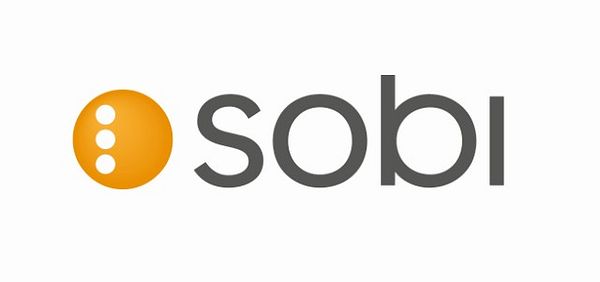Press release -
Early treatment and a longer life – new Orfadin formats meet new patient needs
Swedish Orphan Biovitrum AB (publ) (Sobi) today announced that the Committee for Medicinal Products for Human Use (CHMP) of the European Medicines Agency (EMA) has adopted a positive opinion for the oral suspension formulation and the 20 mg capsule of Orfadin (nitisinone) for the treatment of Hereditary Tyrosinaemia type-1 (HT-1). HT-1 is a rare genetic disease that affects infants and children; it is progressive in nature, may result in liver and kidney failure and can be fatal if untreated.
Twenty years ago before pharmacological treatment was available, less than one third of infants diagnosed with HT-1 before two months of age lived past their second birthday.[1] Treatment with Orfadin combined with dietary restriction of tyrosine and phenylalanine and more widespread newborn screening leading to early diagnosis has dramatically improved outcomes for HT-1 patients.[2] EMA[3] has called for more child-friendly formulations and the new paediatric oral suspension formulation is a response to this call and the needs of the infants and children diagnosed with HT-1 early in life. A paediatric oral suspension of Orfadin, if approved, will facilitate accurate dosing for infants and small children, and contribute to improving quality of life and patient outcomes.
Today people with HT-1 who are diagnosed and started treatment early in life are growing up to become teenagers and adults for the first time in history. As dosing is adjusted by weight, patients need progressively higher doses as they grow, so Sobi has developed the 20 mg capsule to facilitate treatment regimens that support adherence in adolescent and adult patients. The HT-1 patient journey – from earlier screening and diagnosis, to improved outcomes and a longer life expectancy – has driven the development of Orfadin dosage forms and formulations to continuously meet new unmet medical needs of HT-1 patients.
“Orfadin reflects Sobi’s vision – where people affected by genetic disease can be diagnosed at birth and gain access to a therapy which can sustainably improve their lives over the long term,” says Geoffrey McDonough, CEO and President of Sobi. “Working with the HT-1 community over the years has guided us to understand their ongoing medical needs. With these new dosage forms and formulations we will be able to better provide solutions so that patients may pursue full and healthy lives within the boundaries of their disease.”
Orfadin is approved in the EU and several other countries for the treatment of patients with confirmed diagnosis of hereditary tyrosinaemia type 1 (HT-1) in combination with dietary restriction of tyrosine and phenylalanine. HT-1 is a progressive disease where the body lacks the ability to break down the amino acid tyrosine. Without treatment, HT-1 is ultimately fatal. Orfadin, together with the appropriate diet, is an essential part of effective HT-1 treatment.
[1] van Spronsen FJ, Thomasse Y, Smit GP, et al. Hepatology. 1994;20(5):1187-1191
[2] Orfadin EPAR: Product information 25/07/2013 Orfadin -EMEA/H/C/000555 -IB/0045
[3]http://www.ema.europa.eu/docs/en_GB/document_library/Other/2009/12/WC500026493.pdf
---
About Orfadin
Orfadin (nitisinone) blocks the breakdown of tyrosine, thereby reducing the amount of toxic by-products in the body. People with Hereditary Tyrosinaemia type-1 (HT-1) have problems breaking down an amino acid called tyrosine. Toxic by-products are formed and accumulate in the body, which can cause liver failure, renal dysfunction and neurological complications. In the most common form of the disease, symptoms arise within the first six months of the child’s life. Patients must maintain a special diet in combination with Orfadin treatment as tyrosine remains in the body. Approximately 1,000 persons are identified as living with HT-1 today.
Orfadin is a proprietary product and is developed by and marketed globally by Sobi.
Topics
- Health, Health Care, Pharmaceuticals
Categories
- ht-1
- hereditary tyrosinaemia type 1
- orfadin®
- children
- sobi
- rare diseases
- paediatric formulation
About Sobi
Sobi is an international specialty healthcare company dedicated to rare diseases. Our mission is to develop and deliver innovative therapies and services to improve the lives of patients. The product portfolio is primarily focused on Haemophilia, Inflammation and Genetic diseases. We also market a portfolio of specialty and rare disease products for partner companies across Europe, the Middle East, North Africa and Russia. Sobi is a pioneer in biotechnology with world-class capabilities in protein biochemistry and biologics manufacturing. In 2014, Sobi had total revenues of SEK 2.6 billion (USD 380 M) and about 600 employees. The share (STO: SOBI) is listed on NASDAQ OMX Stockholm. More information is available at www.sobi.com.
For more information please contact
Media relations
Oskar Bosson, Head of Communications
T: +46 70 410 71 80
oskar.bosson@sobi.com
Investor relations
Jörgen Winroth, Vice President, Head of Investor Relations
T: +1 347-224-0819, +1 212-579-0506, +46 8 697 2135
jorgen.winroth@sobi.com
